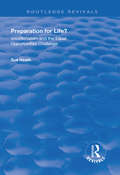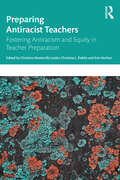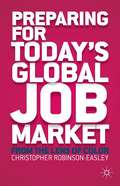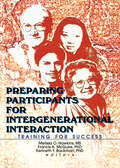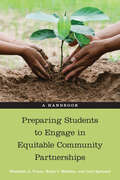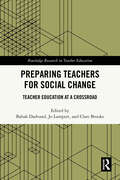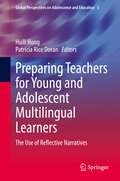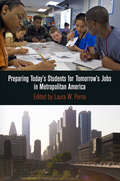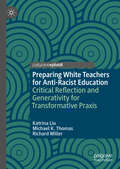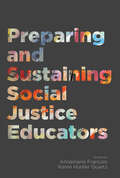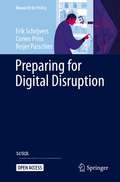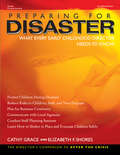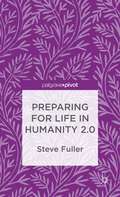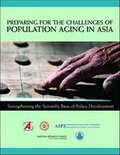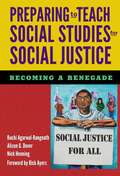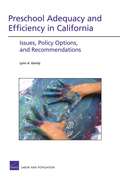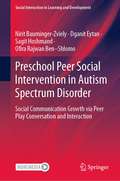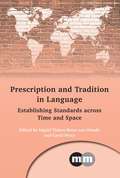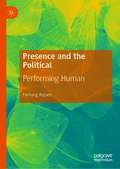- Table View
- List View
Prekäre Gleichstellung
by Mike Laufenberg Martina Erlemann Maria Norkus Grit PetschickDer vorliegende Band nimmt Wechselbeziehungen zwischen Gleichstellungspolitiken, strukturellen Diskriminierungsformen und prekären Arbeitsverhältnissen in der neoliberalen Hochschule in den Blick.Die Arbeits- und Lebenssituation von Wissenschaftler_innen hat sich in den vergangenen zwei Jahrzehnten tief greifend verändert. Die fortschreitende Ökonomisierung von Hochschulen und anderen Wissenschaftsorganisationen hat zu einer Zuspitzung von Wettbewerb und Konkurrenz geführt, die sich auch auf die Arbeits- und Wissenschaftskultur auswirkt. Insbesondere der akademische Mittelbau ist von einer verschärften Prekarisierung wissenschaftlicher Arbeitsverhältnisse und Laufbahnen betroffen. Zeitgleich lässt sich eine verstärkte Institutionalisierung von Gleichstellungs- und Diversitypolitiken in der Wissenschaft beobachten. Doch während an den hiesigen Universitäten heute mehr Frauen als je zuvor studieren, promovieren und wissenschaftliche Laufbahnen einschlagen, wirken strukturelle gruppenbezogene Benachteiligungen und Diskriminierungsformen fort. Die Ökonomisierung und Prekarisierung wissenschaftlicher Arbeit sowie die Thematisierung von Geschlechterungleichheit, institutionellem Rassismus und sozialer Selektivität in der Wissenschaft haben in den vergangenen Jahren als Einzelphänomene Aufmerksamkeit erfahren, wurden bislang jedoch nur selten systematisch in Bezug zueinander untersucht.Die Herausgeber_innenDr. Mike Laufenberg ist wissenschaftlicher Mitarbeiter am Zentrum für interdisziplinäre Frauen- und Geschlechterforschung an der Technischen Universität Berlin.Dr. Martina Erlemann ist Maria-Göppert-Mayer-Gastprofessorin für Technik & Gender an der Hochschule Emden/Leer.Maria Norkus ist wissenschaftliche Mitarbeiterin am Institut für Soziologie der Technischen Universität Berlin.Grit Petschick ist wissenschaftliche Mitarbeiterin am Institut für Chemie der Technischen Universität Berlin.
Prekäre Intimität: Eine Ethnografie der Körperarbeit in Nagel- und Kosmetikstudios (Geschlecht und Gesellschaft #78)
by Isabel KleinDas Buch entwickelt einen affekttheoretisch informierten Begriff prekärer Intimität auf Grundlage ethnografischer Feldforschung. Intimität und intime Arbeit führen zu einer spezifischen Form der Prekarisierung, deren Konzeptualisierung auch über das untersuchte Feld hinausreicht und wichtige Impulse für die Erforschung des Wandels der Arbeits- und Geschlechterverhältnisse liefert. Mit Hinblick auf das Forschungsdesiderat sogenannter einfacher feminisierter Dienstleistungen zeigt die Autorin, dass Arbeit, die sich mit dem Lebendigen befasst, weit mehr als Care-Arbeiten umfasst; Begriffe wie „einfache” Dienstleistungen reproduzieren diesen Ausschluss und verkennen die Komplexität der verrichteten Arbeit an anderen Körpern.
Prenatal Family Dynamics: Couple and Coparenting Relationships During and Postpregnancy
by James P. McHale Regina Kuersten-HoganThis book examines family interactions and relationships during the transition to parenthood. It offers a unique integration of different lines of research on prenatal family dynamics contributed by leading family researchers in North America and Europe who use observational approaches to study emergent family processes. The book explores prenatal dynamics in diverse families, including adolescent couples, same-sex couples, couples experiencing infertility, and couples expecting their second child. The introduction, anchored in family systems and structural theories, provides an overview of challenges couples commonly experience during the transition to parenthood and details prenatal family processes that predict postpartum adjustment in families. This sets the stage for subsequent chapters by emphasizing unparalleled windows into prenatal family dynamics provided by direct observation. Initial chapters focus on predictors of prenatal interactions and partners’ representations of parenthood. Subsequent chapters describe original research on prebirth couple interactions and the coparenting relationship emerging during pregnancy. The volume includes several studies that rely on innovative research designs using observations of simulated couple encounters with their newborn, represented by a life-sized infant doll. The book concludes with a review of recent prenatal intervention programs designed to improve interpersonal and coparenting relationships of married and unmarried couples. The volume offers recommendations for future research on prenatal family dynamics, including suggestions for methodological advances, exploration of prenatal risk factors, expansion of conceptual models to incorporate culturally-meaningful coparents besides mothers and fathers, and further focus on prenatal intervention programs. This book is an essential resource for researchers, clinicians and professionals, and graduate students in the fields of infant mental health/early child development, family studies, pediatrics, developmental psychology, public health, social work, and early childhood education.
Prenatal Stress and Child Development
by Ashley Wazana Eszter Székely Tim F. OberlanderThis book examines the complex impact of prenatal stress and the mechanism of its transmission on children’s development and well-being, including prenatal programming, epigenetics, infl ammatory processes, and the brain-gut microbiome. It analyzes current findings on prenatal stressors affecting pregnancy, including preconception stress, prenatal maternal depression, anxiety, and pregnancy-specific anxieties. Chapters explore how prenatal stress affects cognitive, affective, behavioral, and neurobiological development in children while pinpointing core processes of adaptation, resilience, and interventions that may reduce negative behaviors and promote optimal outcomes in children. Th is complex perspective on mechanisms by which early environmental influences interact with prenatal programming of susceptibility aims to inform clinical strategies and future research targeting prenatal stress and its cyclical impact on subsequent generations.Key areas of coverage include:The developmental effects of prenatal maternal stress on children.Epigenetic effects of prenatal stress.Intergenerational transmission of parental early life stress.The microbiome-gut-brain axis and the effects of prenatal stress on early neurodevelopment.The effect of prenatal stress on parenting.Gestational stress and resilience.Prenatal stress and children’s sleeping behavior.Prenatal, perinatal, and population-based interventions to prevent psychopathology.Prenatal Stress and Child Development is an essential resource for researchers, professors and graduate students as well as clinicians, therapists, and related professionals in infancy and early childhood development, maternal and child health, developmental psychology, pediatrics, social work, child and adolescent psychiatry, developmental neuroscience, and related behavioral and social sciences and medical disciplines.Excerpt from the foreword:“I would make the plea that in addition to anyone with an interest in child development, this book should be essential reading for researchers pursuing “pre-clinical, basic science models of neurodevelopment and brain health”…. This book provides what in my mind is the most advanced compilation of existing knowledge and state-of-the-art science in the field of prenatal psychiatry/psychology (and perhaps in the entire field of prenatal medicine). This volume can brilliantly serve to focus future directions in our understanding of the perinatal determinants of brain health.”Michael J MeaneyJames McGill Professor of MedicineTranslational Neuroscience Programme Adjunct Professor of Paediatrics
Preparation for Life?: Vocationalism and the Equal Opportunities Challenge (Routledge Revivals)
by Sue HeathFirst published in 1997, this volume contributes to the debate on the ground-breaking Technical and Vocational Education Initiative (TVEI) introduced by Margaret Thatcher by exploring the implications of its equal opportunities policy. The scheme was announced in 1982, piloted in 1983, extended nationally in 1987 and ended in 1997. It responded to criticisms that the education system was failing to meet the needs of employers and committed to equal opportunities for boys and girls along with increasing access to technology at the genesis of the computing era. The TVEI represented the first major intervention by central Government in curriculum development in England and was organised on a local authority level. The author, Sue Heath, had experienced mixed messages for what students of each gender could expect to achieve and she remained fascinated by the implications of the TVEI for 1980s school curriculums. Based on research begun in 1989, the volume reassesses the significance of the TEVI as a landmark policy in education. Heath examines areas including vocationalism, the issue of gender, implementing the TVEI locally, the curricular experiences of TVEI pupils and whether the TVEI succeeded in preparing students for the world of work and later life.
Preparing Antiracist Teachers: Fostering Antiracism and Equity in Teacher Preparation
by Christina L. Dobbs Christine Montecillo Leider Erin NerlinoPreparing Antiracist Teachers: Fostering Antiracism and Equity in Teacher Preparation examines multiple strategies and theories for developing antiracist attitudes and actions in teachers and teacher candidates. This textbook uses critical consciousness as a framework to help practitioners and scholars to facilitate the process of doing antiracist work.The book is divided into three sections, with Part 1 focusing on critical reflection, which refers to a social analysis and moral rejection of societal inequities, such as social, economic, racial/ethnic, and gender inequities, that constrain well-being and human agency. It shows that those who are critically reflective view social problems and inequalities in systemic terms and are therefore better able to address them. Part 2 examines sociopolitical efficacy, which refers to the perceived capacity to effect social and political change by individual and/or collective activism. Part 3 centers on critical action, that is, individual or collective action taken to change aspects of society, such as institutional policies and practices, that are perceived to be unjust. This is a broad view of activism that can include participation in activities such as voting, community organizing, and peaceful protests.Showcasing both USA-based and international case studies, Preparing Antiracist Teachers will support teacher educators in their work by presenting nuanced and important means of teacher education for antiracism and critical consciousness. It will also benefit those studying related courses, including Teacher Education, Social Justice Education, and Multicultural Education.
Preparing Data for Analysis: From Raw to Ready (Quantitative Applications in the Social Sciences)
by Bianca ManagoThis book focuses on the process of preparing raw data for analysis—commonly known as data cleaning. It covers a range of topics including data compilation, variable naming and labeling, data examination, and variable re-coding and transformations, among others. Author Bianca Manago discusses best practices for data preparation and analysis, emphasizing the importance of prioritizing transparency, best practices for writing script files, and file naming and organization. Two example projects and datasets are used to illustrate the methods in the book, and the datasets, script files, and output files in both R and Stata are available to download at https://github.com/biancamanago/DataPreparation_QASS2025.
Preparing Data for Analysis: From Raw to Ready (Quantitative Applications in the Social Sciences)
by Bianca ManagoThis book focuses on the process of preparing raw data for analysis—commonly known as data cleaning. It covers a range of topics including data compilation, variable naming and labeling, data examination, and variable re-coding and transformations, among others. Author Bianca Manago discusses best practices for data preparation and analysis, emphasizing the importance of prioritizing transparency, best practices for writing script files, and file naming and organization. Two example projects and datasets are used to illustrate the methods in the book, and the datasets, script files, and output files in both R and Stata are available to download at https://github.com/biancamanago/DataPreparation_QASS2025.
Preparing For Today’s Global Job Market
by Christopher Anne Robinson-easleyFrom the Lens of Color identifies and delineates a methodology for effectively positioning and/or repositioning oneself in today's global job market that moves significantly beyond strategies associated with simply developing a resume, cover letter or business plan.
Preparing Participants for Intergenerational Interaction: Training for Success
by Kenneth Backman Melissa Hawkins Francis A McguirePreparing Participants for Intergenerational Interaction: Training for Success examines established intergenerational programs and provides the training methods necessary for activity directors or practitioners to start a similar program. This book contains exercises that will help you train colleagues and volunteers for these specific programs and includes criteria for activity evaluations. Preparing Participants for Intergenerational Interaction will help you implement programs that enable older adults to build friendships, pass down their skills and knowledge to adolescents, and provide youths with positive role models.Discussing the factors that often limit the interaction of older adults with youths, this text stresses the importance of conveying information and history to younger generations. You will learn why the exchange between different generations is crucial to society and to the improvement of the community in which you live. Preparing Participants for Intergenerational Interaction provides you with proven suggestions and methods that will make your program successful, including: examining Howe-To Industries, a program that teaches entrepreneurial skills to youths through older adults focusing on activities between older adults and youths that address aging sensitivity and racial and ethnic understanding defining the roles of a mentor, including teacher, trainer, developer of talent, and counselor increasing support and understanding in your community by defining target markets and selling the project to the public describing the aspects of group dynamics and how group decisionmaking methods are used to assess the success of the program and its volunteers understanding the community where participants live in order to address issues important to them, such as poverty and other social problems Containing sample handouts, self-evaluations, and detailed lessons for different types of programs, this book offers you guidelines that apply to participants that have a variety of needs within different communities. Preparing Participants for Intergenerational Interaction: Training for Success will enable you to help older adults remain an active and essential part of these communities by teaching youths valuable life skills they may not receive from anyone else.
Preparing Students to Engage in Equitable Community Partnerships: A Handbook
by Elizabeth A. Tryon Haley Madden Cory SprinkelWhen done properly, community engagement in academia can have value for all stakeholders. Authentic experiences are more useful for students; faculty can add new knowledge to the field and their own toolbelts; and communities feel their investment has generated a useful deliverable or even a long-term partnership. Preparing Students to Engage in Equitable Community Partnerships provides a wealth of valuable resources and activities to help impart ideas of identity, privilege, oppression, bias, and power dynamics to best support students and community in these relationships. Believing that authenticity only comes about in an atmosphere of mutual respect and self-awareness, the authors argue for cultural and intellectual humility. Each chapter looks at topics and issues through different lenses, complete with underlying theories, and relates those discussions to concrete classroom activities, facilitation strategies, and scholarly frames. In addition, the authors include contributions from a diverse group of practitioners at community colleges, private colleges, historically Black colleges and universities, and minority-serving institutions. Preparing Students to Engage in Equitable Community Partnerships is a much-needed, comprehensive resource for community-engaged professionals as they prepare students for building relationships when entering a community for learning or research purposes.
Preparing Teachers for Social Change: Teacher Education at a Crossroad (Routledge Research in Teacher Education)
by Jo Lampert Clare Brooks Babak DadvandThis book critically evaluates the dynamic landscape of teacher education on a global scale, delving into its recent advancements, innovations, and emerging paradigms. Recognizing the need to arm teachers with the capacity to address contemporary challenges, the authors emphasize inventive approaches within teacher education that can foster the ability to confront problems such as unprecedented inequality, resurgence of ultra-right movements, environmental crises, and the interconnected dilemmas of today's world.By analysing the intricacies, strengths, and limitations inherent in existing teacher education models, Dadvand, Lampert, and Brooks and their contributors examine current frameworks and consider the potential and drawbacks in preparing educators to effectively tackle multifaceted challenges. The chapters focus on the opportunities and limitations presented by ongoing trends in Initial Teacher Education, particularly in relation to the most urgent issues of our time.This valuable resource for educators, policymakers, and researchers is an essential read for anyone committed to fostering social justice and inclusive education and seeking to equip educators for the challenges of today's world.
Preparing Teachers for Young and Adolescent Multilingual Learners: The Use of Reflective Narratives (Global Perspectives on Adolescence and Education #3)
by Patricia Rice Doran Huili HongMultilingual learners (MLs) students spend most of their school time with their teachers, who often feel professionally unprepared to meet their linguistically diverse students' needs. As such, preparing teachers for increasing numbers of multilingual learners (MLs) has become a critical factor in promoting equity and success for all students in our global society. This book explores and highlights the reflective narratives of teacher educators, in-service, and preservice teachers. It shows how these narratives are grounded in their personal lives, professional training, and daily teaching, and how they can unfold the complexities in their various experiences and the rich implications for MLs teaching and teacher preparation. The book presents papers that utilize teachers' reflective narratives to prepare and train teachers who are or will be working with MLs. It discusses the challenges and implications of teaching groups of MLs made up of diverse learners, including immigrants, refugees, and learners with disabilities. 'This book seeks to change the narrative of some of our most vulnerable student populations by giving voice to the experiences, challenges, success, and best practices encountered in the international education landscape. The power contained within each chapter is the systematic and intentional reflections that bring the marginalized stories to the center of the discussion. Anyone seeking an understanding of how reflective narrative can build equity and social justice for multilingual learners will appreciate the breadth of experience described. This understanding is critical for culturally and linguistically diverse teaching and learning.' Jordan González, Ph.D., St. John's University, NY
Preparing Today's Students for Tomorrow's Jobs in Metropolitan America
by Laura W. PernaEducation, long the key to opportunity in the United States, has become simply essential to earning a decent living. By 2018, 63 percent of all jobs will require at least some postsecondary education or training. Teachers and civic leaders stress the value of study through high school and beyond, but to an alarmingly large segment of America's population--including a disproportionate number of ethnic and racial minorities--higher education seems neither obtainable nor relevant. Preparing Today's Students for Tomorrow's Jobs in Metropolitan America, edited by Laura W. Perna, offers useful insights into how to bridge these gaps and provide urban workers with the educational qualifications and skills they need for real-world jobs.Preparing Today's Students for Tomorrow's Jobs in Metropolitan America probes more deeply than recent reports on the misalignment between workers' training and employers' requirements. Written by researchers in education and urban policy, this volume takes a comprehensive approach. It informs our understanding of the measurement and definition of the learning required by employers. It examines the roles that different educational sectors and providers play in workforce readiness. It analyzes the institutional practices and public policies that promote the educational preparation of today's students for tomorrow's jobs. The volume also sheds light on several recurring questions, such as what is the "right" amount of education, and what should be the relative emphasis on "general" versus "specific" or "occupational" education and training?Ensuring that today's students have the education and training to meet future career demands is critical to the economic and social well-being of individuals, cities, and the nation as a whole. With recommendations for institutional leaders and public policymakers, as well as future research, this volume takes important steps toward realizing this goal.
Preparing White Teachers for Anti-Racist Education: Critical Reflection and Generativity for Transformative Praxis
by Richard Miller Katrina Liu Michael K. ThomasUsing a framework combining Critical Race Theory and Critical Reflection and Generativity for Transformative Praxis, this book examines both how white preservice teachers conceive of race and racism (habits of mind) and how they react when dealing with race and racism in the classroom (patterns of acting). With firm grounding in real-world data, the authors detail ways in which teacher educators can recognize and deal with preservice teachers who cannot—or will not—translate their reflections on race into actions against racism.
Preparing and Sustaining Social Justice Educators
by Annamarie Francois and Karen Hunter QuartzPreparing and Sustaining Social Justice Educators spotlights the challenging and necessary work of fostering social justice in schools. Integral to this work are the teachers and school leaders who enact the principles of social justice—racial equity, cultural inclusivity, and identity acceptance—daily in their classrooms. This volume makes the case that high-quality public education relies on the recruitment, professional development, and retention of educators ready to navigate complex systemic and structural inequities to best serve vulnerable student populations.Annamarie Francois and Karen Hunter Quartz, along with contributing scholars and practitioners, present an intersectional approach to educational justice. The approach is grounded in research about deeper learning, community development, and school reform. Throughout the book, the contributors detail professional activities proven to sustain social justice educators. They show, for example, how effective teacher coaching encourages educators to confront their explicit and implicit biases, to engage in critical conversations and self-reflection, and to assess teacher performance through a social justice lens.The book illustrates how professional learning collaborations promote diverse, antiracist, and socially responsible learning communities. Case studies at three university-partnered K–12 schools in Los Angeles demonstrate the benefits of these professional alliances and practices.Francois and Quartz acknowledge the difficulty of the social justice educator&’s task, a challenge heightened by a K–12 teacher shortage, an undersupplied teacher pipeline, and school closures. Yet they keep their sights set on a just and equitable future, and in this work, they give educators the tools to build such a future.
Preparing for Digital Disruption (Research for Policy)
by Erik Schrijvers Corien Prins Reijer PasschierThis open access book offers an analysis of why preparations for digital disruption should become a stated goal of security policy and policies that aim to safeguard the continuity of critical infrastructure. The increasing use of digital technology implies new and significant vulnerabilities for our society. However, it is striking that almost all cyber-security measures taken by governments, international bodies and other major players are aimed at preventing incidents. But there is no such thing as total digital security. Whether inside or outside the digital domain, incidents can and will occur and may lead to disruption. While a raft of provisions, crisis contingency plans and legal regulations are in place to deal with the possibility of incidents in the ‘real world’, no equivalence exists for the digital domain and digital disruption. Hence, this book uniquely discusses several specific policy measures government and businesses should take in order to be better prepared to deal with a digital disruption and prevent further escalation.
Preparing for Disaster: What Every Early Childhood Director Needs to Know
by Elizabeth Shores Cathy GraceWithout warning, a catastrophic event can destroy an early childhood program. Based on Cathy Grace and Elizabeth Shores' experiences working in Mississippi after Hurricane Katrina, Preparing for Disaster explains the steps directors can take to insure the safety of their program and the children they care for. With forms, worksheets, staff-training workshops, and task lists, as well as helpful guidelines and insights, this groundbreaking guide is filled with practical advice for every program director:* Create a Disaster Readiness Master Plan--and implement it. * Train teachers and administrators how to react in a catastrophic event. * Educate parents about your disaster plan to reduce panic. * Learn to create planned evacuation routes and how to notify local emergency management agencies of your plans. * Complete insurance, inventory, records back-up, and rental agreement forms. Preparing for Disaster provides practical advice and information to prepare for and respond to universal disasters like fires and epidemics and regional disasters such as tornadoes and earthquakes. Protect your program before disaster strikes. Preparing for Disaster is the companion book to After the Crisis: Using Storybooks to Help Children Cope.
Preparing for Life in Humanity 2.0
by Steve FullerDeveloping directly from Fuller's recent book Humanity 2. 0, this is the first book to seriously consider what a 'post-' or 'trans'-' human state of being might mean for who we think we are, how we live, what we believe and what we aim to be.
Preparing for the Challenges of Population Aging in Asia: Strengthening the Scientific Basis of Policy Development
by Chinese Academy of Social Sciences"Preparing for the Challenges of Population Aging in Asia" discusses the challenges posed by a rapidly aging population and identifies needed research to help policymakers better respond to them. While the percentage of elderly people in nearly every nation is growing, this aging trend is particularly stark in parts of Asia. Projections indicate that the portion of the population age 65 and older will more than triple in China, India, and Indonesia and more than double in Japan between 2000 and 2050, based on data from the United Nations. Moreover, this demographic shift is coinciding with dramatic economic and social changes in Asia, including changing family structures and large-scale migrations from rural to urban areas. These trends raise critical questions about how nations can develop policies that best support health and economic well-being in large and growing populations at older ages. Governments in Asia still have time to determine the best ways to respond to the unfolding demographic transformation, but taking advantage of this window of opportunity will require new research to shed light on the status and needs of the aging population. Currently the research base on aging in this region is relatively underdeveloped. This book identifies several key topics for research to inform public policy, including changing roles in the family; labor force participation, income, and savings; and health and well-being of the public.
Preparing to Teach Social Studies for Social Justice
by Ruchi Agarwal-Rangnath Alison G. Dover Nick HenningThis practical book shows how veteran, justice oriented social studies teachers are responding to the Common Core State Standards, focusing on how they build curriculum, support students’ literacy skills, and prepare students to think and act critically within and beyond the classroom. In order to provide direct classroom-to classroom insights, the authors draw on letters written by veteran teachers addressed to new teachers entering the field. <P><P> The first section of the book introduces the three approaches teachers can take for teaching for social justice within the constraints of the Common Core State Standards (embracing, reframing, or resisting the standards). The second section analyzes specific approaches to teaching the Common Core, using teacher narratives to illustrate key processes. The final section demonstrates how teachers develop, support, and sustain their identities as justice-oriented educators in standards-driven classrooms. Each chapter includes exemplary lesson plans drawn from diverse grades and classrooms, and offers concrete recommendations to guide practice.
Preschool Adequacy and Efficiency in California
by Lynn A. Karoly David R. Howell Tom Latourrette David E. Mosher Lois M. Davis Preston NiblackThe California Preschool Study examined gaps in school readiness and achievement in the early grades among California children and the potential for high-quality preschool to close those gaps, the use of early care and education (ECE) services and their quality, and the system of publicly funded ECE programs for three- and four-year-olds. This analysis integrates the results from the prior studies and makes recommendations for preschool policy.
Preschool Peer Social Intervention in Autism Spectrum Disorder: Social Communication Growth via Peer Play Conversation and Interaction (Social Interaction in Learning and Development)
by Nirit Bauminger-Zviely Dganit Eytan Sagit Hoshmand Ofira Rajwan Ben–ShlomoThis book presents the Preschool Peer Social Intervention (PPSI), a manualized comprehensive social curriculum to enhance peer-interaction for pre-schoolers with Autism Spectrum Disorders (ASD) in three key domains: play, interaction, and conversation. The book outlines the PPSI’s transactional approach in each of the three intervention domains and incorporates developmental features and age-appropriate play, interaction, and conversation skills while accounting for individual differences in social communication abilities. The intervention is designed to be implemented within the child’s natural social environment, such as preschool, and it includes the child’s social agents, namely, their peers, teachers, and parents. PPSI intervention curricula addressed in this book are based on typical play, interaction, and conversation development, taking into account the social and communication challenges found to characterize young children with ASD in these domains. Building up the ability to play, interact and converse more efficiently with peers may render a substantial impact on preschoolers with ASD, with vast potential for improving not only these children’s immediate social experience with peers, but also their future social competence that relies on these early building blocks.
Prescription and Tradition in Language: Establishing Standards across Time and Space
by Carol Percy Ingrid Tieken-Boon van OstadeThis book contextualises case studies across a wide variety of languages and cultures, crystallising key interrelationships between linguistic standardisation and prescriptivism, and between ideas and practices. It focuses on different traditions of standardisation and prescription throughout the world and addresses questions such as how nationalistic idealisations of 'traditional' language persist (or shift) amid language change, linguistic variation and multilingualism. The volume explores issues of standardisation and the sociolinguistic phenomenon of prescription as a formative influence on the notional standard language as well as the interconnections between these in a wide range of geographical contexts. It balances the otherwise strong emphasis on English in English language publications on prescriptivism and breaks new ground with its multilingual approach across languages and nations. The book will appeal to scholars working within different linguistic traditions interested in questions relating to all aspects of standardisation and prescriptivism.
Presence and the Political: Performing Human
by Farhang RajaeeThis book deals with a concern of how humanity performs toward itself and how it performs within the public realm, and where it must be in relation with others. Public life is not solely about politics but also the political, i.e., intellectual, moral, economic, religious, and collective habits—including fashions and amusements, artefacts, histories, and legacies. This book argues that man raison d'être in worldly life is to have a civil presence and create civilization. It contends that what makes it possible is the coming together of “presence, ethos, and theatre” and their working in concert. The first half of this book elaborates on the nuances of these three pillars, and the second half offers three examples of civilizations that have succeeded to achieve this within what it claims to be three major worldviews that he calls “divine-immanence, the divine-transcendence, and human-immanence.”




